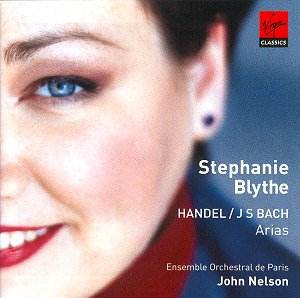 Stephanie Blythe’s mezzo-soprano is a voice that comes along rarely—rich, powerful, and commanding, yet capable of exquisite subtlety. In this recording of Handel and J.S. Bach arias, Blythe, under the direction of John Nelson, joins forces with the Ensemble Orchestral de Paris to deliver a deeply moving and stylish traversal of Baroque repertoire. The album is a celebration of everything that makes Baroque vocal music transcendent: majesty, introspection, and emotional complexity, all rendered here with formidable artistry.
Stephanie Blythe’s mezzo-soprano is a voice that comes along rarely—rich, powerful, and commanding, yet capable of exquisite subtlety. In this recording of Handel and J.S. Bach arias, Blythe, under the direction of John Nelson, joins forces with the Ensemble Orchestral de Paris to deliver a deeply moving and stylish traversal of Baroque repertoire. The album is a celebration of everything that makes Baroque vocal music transcendent: majesty, introspection, and emotional complexity, all rendered here with formidable artistry.
Blythe’s affinity for Handel is evident throughout. Her “Ombra mai fù” from Serse unfolds with a serene beauty that is almost hypnotic. Her ability to sustain the long, arching phrases with such tender grace gives the aria a heartfelt immediacy. Blythe’s control over the dynamics—from the gentlest pianissimo to a fuller, more resonant sound—is masterful, adding layers of expression that are all too often lost in less capable hands. In arias like “Dopo notte” from Ariodante, she demonstrates an astonishing agility, managing the rapid runs and ornate embellishments with an ease that seems entirely natural. There is drama, yes, but also joy—a kind of vibrant, buoyant energy that makes these faster pieces leap from the speakers.
The Bach selections offer a different but equally compelling side of Blythe’s artistry. “Erbarme dich, mein Gott” from St. Matthew Passion is a haunting highlight. Here, Blythe taps into the deepest well of emotion, her voice carrying the weight of human sorrow and contrition with heartbreaking simplicity. The Ensemble Orchestral de Paris is a sensitive partner in this, with the strings weaving a lament that seems to cradle Blythe’s voice, giving it space to soar and mourn. There is a sense of restraint here that amplifies the emotion—no excess, just pure feeling, distilled and shared.
John Nelson’s direction ensures that the orchestral playing never feels merely supportive; it is an integral part of the storytelling. The Ensemble Orchestral de Paris plays with a lightness of touch that never sacrifices precision. Nelson understands the importance of balance in Baroque music, allowing the instrumental lines to converse naturally with Blythe’s voice. His interpretation draws out the warmth and humanity in these works, finding both grandeur and intimacy in every phrase. The interplay between soloist and orchestra feels organic, as though they are discovering each moment together in real time.
The sound quality of the recording further elevates the experience. The engineers have captured Blythe’s voice in all its glorious detail—its warmth, its resonance, and its power. The balance between the vocal and orchestral forces is finely judged, making it possible to hear every nuance, every shift in color. There is a palpable immediacy to the recording, placing the listener right in the room with the performers, surrounded by the ebb and flow of this magnificent music.
Final Thoughts: Stephanie Blythe’s interpretations of these Handel and Bach arias are a masterclass in Baroque singing. Her voice is at once commanding and deeply expressive, and her partnership with John Nelson and the Ensemble Orchestral de Paris results in a recording that is both exhilarating and profoundly moving. For anyone who cherishes the vocal music of the Baroque, this album is an essential listen—a testament not only to Blythe’s vocal prowess but also to her deep understanding of the emotional core of these timeless works.